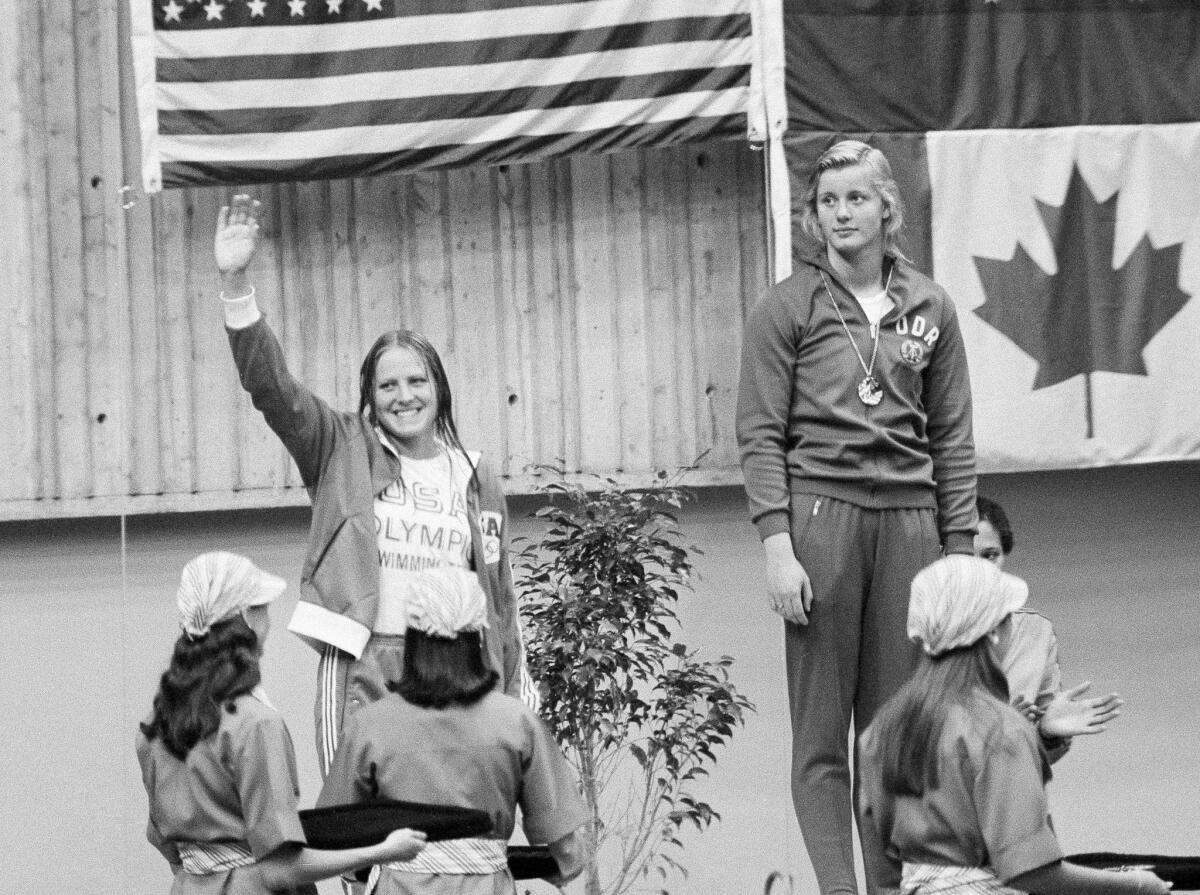‘They took a lot away from me’: Olympian Shirley Babashoff still speaks out against the doping that cost her gold medals in ’76
- Share via
Shirley Babashoff is a two-time Olympic gold medalist — but it’s the four gold medals she didn’t win that stick with her the most.
“It would have changed my life dramatically if I had come back from [the 1976 Games in] Montreal with all the medals that I deserved,” the 59-year-old former swimmer said. “I would have had some endorsements. I bought property with the ones that I had, but I’d like more property. Money can change your life if you have nothing and get a bunch of endorsements. Ask Tiger Woods.”
Forty years after her last Olympic Games, Babashoff, now a letter carrier for the Huntington Beach post office, who raised her now-30-year-old son as a single mother, still maintains that she was robbed by a Cold War-era doping regime that powered East German swimmers to victory over the Americans.
Babashoff was widely considered one of the greatest swimmers in U.S. history — some even called her the female Mark Spitz — but her dream of individual Olympic gold was thwarted by an East German team that swept the women’s individual events in all but one race.
When Babashoff first suggested at the 1976 Games that the East Germans were using performance-enhancing drugs, she was ridiculed by the media. Unlike American swimmer Lilly King, whose finger wagging and vocal criticism of Russian athletes who have been caught doping at this year’s Olympics earned her hero status, Babashoff was painted as a sore loser.
But after the fall of the Berlin Wall in 1989, documents revealed an extensive system of state-sponsored doping that proved her suspicions correct. Still, the International Olympic Committee never struck the East Germans from the 1976 record books or upgraded Babashoff’s silver medals to gold.
“They took a lot away from me,” she said. “And I can’t just let that go.”

Now, as doping scandals once again take center stage at the Olympic Games, the Fountain Valley resident and author of a new book, “Making Waves: My Journey to Winning Olympic Gold and Defeating the East German Doping Program,” hopes renewed attention on the issue will convince the IOC to re-award the medals from the 1976 swimming events.
“It’s not that difficult,” she said. “I don’t know why now isn’t a good time.”
Babashoff first learned to swim at age 8 and later competed with the Huntington Beach Aquatic Club at Golden West College and eventually the Mission Viejo Nadadores.
Her training regimen included waking up at 4:30 a.m. every day to swim before and after school — she attended Fountain Valley High School — and on weekends and holidays. She estimates that during her peak she was swimming 20 miles per day.
At 15, she made her first Olympic team and traveled to Munich, Germany, for the 1972 Games. She won gold in the team 400-meter freestyle relay and silver in the individual 100 and 200 meter freestyle races.
She didn’t take much notice of the East German team —”They weren’t outstanding swimmers,” she said — until the next year, at the 1973 world championships in Belgrade, Yugoslavia, when she immediately realized that something strange was going on.
“The East German swimmers came out of the locker room and they were so big, they looked like wrestlers,” she recalled. “And we thought, ‘My God, those girls aren’t going to be able to swim because they’re so bulky.’
“Instead, they were beating us by five body lengths in the 200-meter freestyle, a race that you usually lose by a second or maybe a tenth of a second,” she said of the team that had won only a handful of medals, none of them gold, the year before. “But they were so far ahead of everyone, and they’d touch the wall and jump out of the water like they didn’t even have to try.”
Each time she saw them after that, Babashoff said, they appeared bigger and more “masculine.”
By the 1976 Olympics in Montreal, it was clear to her and her teammates that the East Germans were doping even though their drug tests always came back clean. The East Germans, on the other hand, attributed their rapidly improved performance to sophisticated swim suits, altitude workouts and other cutting-edge training techniques.
“It was frustrating because it was so obvious what they were doing,” Babashoff said.
Still, Babashoff was the heavy favorite going into the 1976 Games.
“She was considered to be that special once-in-a-lifetime talent,” said Chuck Wielgus, executive director of USA Swimming, the national governing body for competitive swimming in the United States, and executive producer of the new documentary “The Last Gold,” which tells the story of the U.S. women’s swimming team at the 1976 Olympics.
“The expectation was that she would have this [Michael] Phelps-ian performance,” he said, referencing the 23-time gold medalist. “What Mark Spitz did in 1972 in winning seven gold medals — if any woman was going to do something that came close to that, it was going to be Shirley Babashoff.”
She was even featured on the cover of Sports Illustrated under the words, “U.S. Gold Medal Hopefuls.”
But the media quickly turned on her for drawing attention to doping.
When a reporter asked what she thought of her East German competition, Babashoff replied, “Well, except for their deep voices and mustaches, I think they’ll do fine.”
Her comments gained widespread criticism and earned her the nickname “Surly Shirley.”
Babashoff was then beaten by East German swimmers in all four individual races she competed in —the 100-, 200-, 400- and 800-meter freestyle and team 400-meter medley relay. (She earned four silver medals in these five races.) Her one gold medal came in the 400-meter freestyle relay.
This disappointing finish only fueled Babashoff’s reputation for being a poor sport. When she returned home, her picture was printed in Time magazine with the one-word caption: “Loser.”
Babashoff never saw anything wrong in what she said about the East German women — “I said what everyone else thought but that no one wanted to say,” she said — and was adamant that cheating had robbed her of four gold medals. But there was no evidence to back up her accusations of doping.
Then in 1989, after the fall of the Berlin Wall, troves of documents detailing the extent of the East German doping program were released.
“The East German system was the most sophisticated sports medicine and doping program the world has ever seen,” said Mark Johnson, author of “Spitting in the Soup: Inside the Dirty Game of Doping in Sports.” “It was really a Manhattan Project for sports.”
With the help of coaches, trainers and doctors, the state had administered 2 million doses of anabolic steroids to its athletes per year. The East German government also ran its own anti-doping lab to ensure that athletes had washed any drugs out of their system before leaving for international competition.
“The Cold War was the greatest accelerator of doping in sports that we’ve ever seen,” Johnson said. “It was a way to show that the communist way was superior.”
Female athletes were of particular interest to East Germany, he said, because until the 1972 passage of Title IX, American women didn’t have many opportunities to compete.
But the East Germans weren’t alone. Americans also doped, explained Johnson, and while the U.S. government didn’t force its athletes to take drugs, it was complicit by establishing regulatory bodies that would look away for the same geopolitical reasons, he said.
“It was seen as a necessary compromise in order to execute the larger good of defeating the march of communism,” he said.
“Babashoff was a victim because she was trying to swim clean, but the United States on some level was saying, ‘We’re going to overlook doping,’ and the East Germans were saying, ‘We’re going to encourage doping.’ She didn’t have a chance against the Cold War.”
Even after evidence of East Germany’s doping program came to light, Babashoff didn’t feel vindicated.
“I was like, ‘Where’s my medals then?’” she said. “If they’re proven cheaters, then re-award everything.”
Don Catlin, founder of the UCLA Olympic Analytical Laboratory, the first anti-doping lab in the United States and the largest testing facility of performance-enhancing drugs in the world, agrees with Babashoff that doping affected the results of the 1976 Olympics.
“When you’re up against people taking anabolic steroids, you’re generally going to lose,” he said.
While the East Germans may have won more medals than the Americans that year, systemic doping also led to a number of health issues, including infertility, birth defects and cancer.

But Babashoff doesn’t have much sympathy for the East German athletes, even though many of them took the drugs unknowingly or without full understanding of the adverse health effects.
“You know, I’m sorry but I kinda don’t feel sorry for them,” she said. “Maybe I should feel sorry for them, but they hurt a lot of people too. I feel worse for the girls who swam so hard for so long and practiced like I did, 20 miles a day and driving to practice for two hours while going to school.”
As the 2016 Olympic Games come to a close, Babashoff is dismayed by how little has changed in the past 40 years. Reports of another state-sponsored doping program have come to light — this time, in Russia — and the IOC decided not to impose a blanket ban on Russian athletes.
“Once again, I don’t know what the IOC is doing,” she said. “They need to constantly test everyone and stay on it and not let some countries fall by the wayside. And if someone’s dirty, then you can’t compete. You’re out and that’s all there is to it.”
Still, she has faith that someday she’ll be formally awarded gold. Even though she can never reclaim the glory or endorsements she would have received in 1976, Babashoff still feels it’s important, for personal reasons.
“It would mean that I could finally stop talking about it,” she said. “I can tell my grandchildren, and my son can tell his grandchildren. Now you’d have to tell them the whole story with the East Germans, but instead we could say, ‘She has these gold medals and this silver medal.’ And that’s the end of it.”
